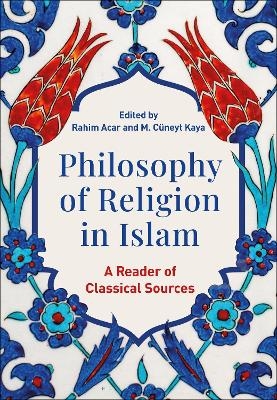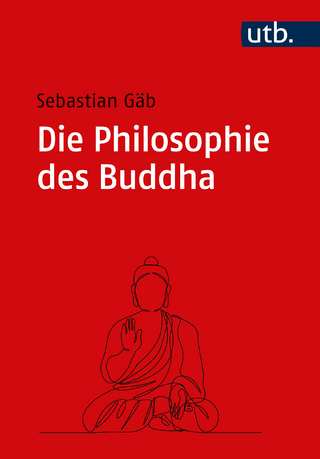
Philosophy of Religion in Islam
Bloomsbury Academic (Verlag)
978-1-350-40613-1 (ISBN)
- Noch nicht erschienen (ca. Februar 2025)
- Versandkostenfrei innerhalb Deutschlands
- Auch auf Rechnung
- Verfügbarkeit in der Filiale vor Ort prüfen
- Artikel merken
Focusing on the classical period of medieval Islamic thought up until the end of the 13th century, this one-of-a kind reader is organized thematically around five parts and covers:
- Conceptions of faith and reason
- The possibility of miracles as the sign of divine support
- Arguments for the God’s existence
- Strategies for understanding religious texts
§ The nature of salvation
Each Part has its own specialized introduction, relating medieval Islamic discussions on that problem to the contemporary discussions in philosophy of religion. Each reading is accompanied by an overview that provides context and background to the argument. Broad and rich, there is a wealth of translated writing here. Granting access to such valuable primary sources, this reader offers us deeper insight into the debates, discussions, and arguments of Islam thinkers on universal questions in philosophy.
Rahim Acar is Professor of Philosophy of Religion at Marmara University, Turkey.
PREFACE
ACKNOWLEDGEMENTS
GENERAL INTRODUCTION
PART I: RELIGION AND REASON, edited by Rahim Acar
Introduction
1. Faith and Reason
2. The Origin and Nature of Religion
3. The Relationship between Religious Teachings and Philosophical-Scientific Theories
Texts
1. Al-Shahrastani: The Position of Doubt in the Face of Faith
2. Al-Ash?ari: A Vindication of the Science of Kalam
3. Ibn al-Mala?imi: The Invalidity of Conjecture in Accepting Religious Beliefs
4. Al-Ghazali: Evaluation of Different Approaches on the Relationship of Reason and Revelation
5. Al-Juwayni: Justification of Prophethood
6. Abu ?atim al-Razi & Abu Bakr al-Razi: Why is There a Need for a Prophet?
7. Al-Farabi: Religion as a Social Order
8. Ibn al-?Arabi: The Meaning of Religion and the Status of Prophethood
9. Al-Farabi: Philosophy, Religion and Theology as Parts of a Hierarchically Ordered Whole
10. Ibn ?ufayl: Revelation and Reason Are Different Ways that Show the Same Truth
11. Ibn Rushd: The Final Words on the Relationship between Philosophy and Religion
PART II: RELIGION AND ETHICS, edited by Hümeyra Özturan
Introduction
1. The Problem of Good and Bad (?usn and qub?)
2. The Content of the Moral Knowledge Based on Religion.
3. Moral Sanction
Texts
1. Qa?i ?Abd al-Jabbar: The Rationality of Good and Evil
2. Al-Juwayni: Judgment on Good and Bad (?usn and qub?) can only be Obtained from Religion
3. Fakhr al-Din al-Razi: Can Reason Judge Whether Something is Good or Bad?
4. Al-Maturidi: On the Imperfectness of our Judgements on the Good and the Bad due to our Ignorance
5. Al-Ghazali: On the Permissibility of Entities whose Status is not Legally Determined
6. Ibn al-?Arabi: The Root and the Characteristics of Morality
7. Al-Ja?i?: Strengthening the Mind with Sanctions Against Desires
PART III: RELIGIOUS EXPERIENCE AND RELIGIOUS KNOWLEDGE, edited by M. Nedim Tan
Introduction
1. Prophetic Guidance and Transmission-based Epistemology
2. Prophethood as a Potency: A Philosophical Perspective
3. Sufism as a Prophethood-Centered Religious Experience
Texts
1. Al-Maturidi: Sources of Knowledge and the Necessity of the Prophet
2. Al-Farabi: Dream, Revelation, and Imagination
3. Ibn Sina: On Proving the Prophecy and the Mission of the Prophet
4. Ibn Sina: Stations of the Knowers
5. Al-Ghazali: Stages of the Perception of the Truth
6. Al-Qay?ari: Sainthood and the Imaginal World
7. Najm al-Din Razi: Dreams and Visions
PART IV: EXTRAORDINARY EVENTS, edited by Ercan Alkan
Introduction
1. Mu?jiza (Miracle)
2. Karama (Blessing/ Divine Gift/Saintly Marvel)
3. Irha? and Ma?una (Precursor and Support)
4. Istidraj and Ikhana (Mischief and Betrayal)
5. Si?r (Magic)
Texts
1. Al-Juwayni: Prophetic Miracles and their Conditions, and Proofs for the Saintly Marvels
2. Ibn ?azm: Miracle as the Evidence of Prophethood and its Differences from Magic and Prophecy
3. Al-Ghazali & Ibn Rushd: Continuity in the Nature and Possibility of Miracles
4. Ibn Sina: The Secrets of the Extraordinary Events
5. Ibn al-?Arabi: Extraordinary Events: Miracles, Blessings, and Magic
PART V: GOD’S EXISTENCE AND UNITY, edited by M. Cüneyt Kaya
Introduction
1. If and How Can God Be Known?
2. Arguments for the Existence of God
A. Ontological Argument
B. Cosmological Arguments: Movement and Beginning to Exist (?uduth)
C. Teleological Argument
3. The Unity of God
Texts
1. Al-Raghib al-I?fahani: The Ways of Knowing God’s Existence
2. Ibn Sina: Existence and Its Causes
3. Al-Juwayni: Proving God’s Existence from the Createdness of the Universe
4. Ibn al-Mala?imi: The Necessity of Knowing God and the Necessity of Reasoning in Knowing Him
5. Ibn Rushd: The Attempts to Prove the Existence of God and the Method of the Qur?an
6. Fakhr al-Din al-Razi: An Overview of the Arguments for the Existence of God
7. Ibn al-?Arabi: Existence of God between Theory and Unveiling
8. Al-Farabi: Unity of the First Existent
PART VI: GOD AND THE UNIVERSE, edited by Rahim Acar
Introduction
1. Creation and the Order of Beings
2. God’s Maintenance of the Universe
3. The Problem of Evil
Texts
1. Ibn Sina: Creation of the Universe and the Order of Existents
2. Al-Shahrastani: Creation of the Universe out of Nothing
3. Al-Qay?ari: The Universal Realms and the Five Levels of Divine Existence
4. Ibn Miskawayh: The Hierarchical Relation among Existents
5. Al-Ja?i?: Al-Na??am’s Thought on Latency (kumun)
6. Ibn Sina: God as the Essential Cause of Everything Created
7. Al-Baqillani: The Critique of the Concept of Nature
8. Qa?i ?Abd al-Jabbar: Divine Justice and Evil in the Universe
9. Al-Nasafi: Creation of Evil
10. Al-Ghazali: This World Is the Most Perfect World that Could Be
PART VII: HOW TO UNDERSTAND THE RELIGIOUS TEXTS?edited by Nail Okuyucu & Rahim Acar
Introduction
1. Philosophical-Scientific Explanations and Statements in Religious Texts
2. Religious Texts as the Source of Moral-Legal Rules
Texts
1. Al-Farabi: The Expression of Truth: The Language of Religion and the Language of Philosophy
2. Al-Ghazali: Hierarchy of Existence and Interpretation (ta?vil)
3. Ibn Rushd: The Theory of Interpretation
4. Qa?i ?Abd al-Jabbar: Understanding and Interpretation of Religious Texts
5. Al-Qunawi: Degrees of Understanding with Respect to Prophetic Knowledge
6. Al-Shafi?i: Understanding the Divine Will: Perspective on Human Obligations
7. Al-Sha?ibi: The Purpose of Establishing the Shari?a
PART VIII: THEOLOGICAL LANGUAGE AND DIVINE RPOPERTIES, edited by Osman Demir
Introduction
1. Knowing and Naming God
2. Understanding the Properties Predicated of God
A. The Literalist Understanding of the Properties Attributed to God
B. Emphasis on Divine Transcendence in Expressions Attributed to God
C. The Balance of Transcendence-Immanence in Divine Properties
D. Categorizing Divine Names and Properties
Texts
1. Fakhr al-Din al-Razi: Whether God’s Reality Can Be Known
2. Al-Ghazali: The Possibility of Knowing God and its Method
3. Al-Maturidi: Divine Names and Attributes do not Require Similarity to Creation
4. Al-Kirmani: Can God Be Known Through Attributes?
5. Ibn Taymiyya: The Salafist Approach to Divine Names and Attributes
6. Ibn al-Jawzi: Criticism of Anthropomorphism within ?anbalism
7. Qa?i ?Abd al-Jabbar: The Divine Attributes in the Mu?tazila School of Thought
8. Ibn Sina: The Attributes of the Necessary Being
9. Al-Qay?ari: The Divine Names and Attributes
10. ?affar al-Qummi: Imams as the Face of Allah
11. Al-Fazari: Divine Attributes and the Classification of Attributes in Kharijism
12. Al-Baqillani: The Concept of Attributes According to the Ash?arite School
PART IX: RELIGIOUS DIVERSITY, edited by Ercan Alkan & Rahim Acar
Introduction
1. Understanding and Interpreting the Fact of Religious Diversity
2. Classification of Approaches in Classical Islamic Thought
A. The Theological Approach and Religious Exclusivism
B. The Epistemological Approach and Religious Inclusivism
C. The Ontological Approach and Religious Pluralism
Texts
1. Al-Maturidi, Ibn al-Jawzi, Kiya al-Harrasi, Fakhr al-Din al-Razi, Al-Biqa?i, Bursawi, Al-Alusi: The People of the Book and the People of the Interval in the Qur?an and the Exegesis
2. Qa?i ?Abd al-Jabbar: The Acts for which a Legally Responsible Person (mukallaf) is Accountable
3. Ikhwan al-?afa?: Religious Diversity
4. Al-Shahrastani: From the Uniqueness of the Truth to the Uniqueness of the True Sect
5. Al-Farabi: Between Religious Pluralism and Religious Inclusivism
6. Ibn al-?Arabi: Beliefs and States
7. Al-Jili & Al-Nablusi: The Truth of Religions and Religious Practices
8. Al-Farghani: On the Oneness of Existence and the Manyness of Belief
PART X: DEATH AND THE HEREAFTER, edited by Hümeyra Özturan
Introduction
1. What is Death? Is Death Good or Bad?
2. Will the Resurrection Be Physical or Spiritual?
3. The Individual Identity of the Resurrected Body
4. What Will Happen in the Afterlife?
5. Rejection of the Transmigration of the Soul
6. The Status of Children, Animals, and the Mentally Handicapped in the Hereafter
Texts
1. Ibn Miskawayh: Fear from Death, Its Quiddity, and the State of the Soul after Death
2. Al-Ghazali: The Reality of Death, its Painfulness, and Obtaining Knowledge of the Reality of Death through Dreams
3. Ibn Sina: On the Invalidity of Claiming Solely Bodily Resurrection
4. Al-Ghazali: On the Invalidity of Rational Arguments about the Afterlife
5. Al-Juwayni: Resurrection after Death
6. Ibn al-?Arabi: The Prophetic Knowledge and the Barzakh
7. Fakhr al-Din al-Razi: The Rejection of the Transmigration of the Soul
8. Al-Ash?ari: The Fate of Children and Animals
| Erscheint lt. Verlag | 20.2.2025 |
|---|---|
| Verlagsort | London |
| Sprache | englisch |
| Maße | 189 x 246 mm |
| Themenwelt | Geisteswissenschaften ► Philosophie ► Östliche Philosophie |
| Geisteswissenschaften ► Religion / Theologie ► Weitere Religionen | |
| ISBN-10 | 1-350-40613-9 / 1350406139 |
| ISBN-13 | 978-1-350-40613-1 / 9781350406131 |
| Zustand | Neuware |
| Informationen gemäß Produktsicherheitsverordnung (GPSR) | |
| Haben Sie eine Frage zum Produkt? |
aus dem Bereich


